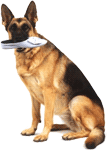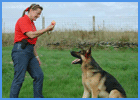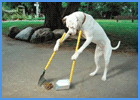Dog Training Tricks, Tips, and Lessons

Why Is Dog Training Important?
Most people don't understand the importance of dog training. Having your dog trained is an essential part of having a great relationship with your dog. If your dog doesn't have good obedience skills, you will have a troubled time establishing rules with your dog. It's also good to note that a trained dog is a happier dog. Most dogs love to please, and when they do something correctly, they will be really happy.
Puppy Training
Dog Supplies |
Types Of Dog Training
Clicker Training
Clicker training is one of the most effective and humane ways to train any dog. It's best to start young with puppies with this method of training. Clicker training uses a small device called a clicker. To make a dog react, you press a button on the device which makes a distinguished clicking sound. When the dog hears this, they are programmed to learn. Over time, they develop a response to the clicker. Using clicker training in conjunction with positive reinforcement will make your dog a quick and happy learner.
Clicker Training Step By Step
1) Let the behavior happen naturally. You can also use some type of lure to get them to do the desired action.
2) As soon as your dog completes the desired action, click the clicker.
3) Reward your dog. Either give them a treat or verbally praise them.
4) Take them out of the desired position or action.
5) Repeat the action over and over. Start adding in verbal commands right before they do the action.
6) Over time, use the clicker and rewards less and less.
7) Never scold or get frustrated with your learning dog. Use constant repetition and your dog will eventually learn.
 |
 |
Dog Whispering
Dog whispering is one of the most advanced techniques when it comes to training a dog. However, because it is so difficult, some would argue that it is also the most effective form of dog training. Dog whispering is being able to have the ability to connect with your dog and relate with them based on their body language.
About Dog Whispering
Dog whisperers have usually developed a level of understanding and awareness in a dog that allows them to understand the canine species. Dog whispering has further developed upon the notion that you can have a two way communication with a dog. By studying a dog's body language and actions, dog whisperers can determine what the dog is trying to communicate.
Dog Tricks You Can Learn Today
Teach Your Dog To Sit
Teaching your dog to sit is probably one of the easiest, yet most useful, tricks you can teach to your dog. If you haven't trained your dog how to sit, this is a good starting point.
Teach Your Dog To Stay
This is a great trick because it gives your dog boundaries. If you need to be in a place where your dog shouldn't be, you can have them stay. For instance, if you need to walk into your street, you can have your dog safely stay on the lawn.
Teach Your Dog To Lay Down
When you teach your dog to lay down, they also become more docile. This means that if you have a hyperactive dog that won't calm down, you can have them learn to lay down to relax them. This is also a great dog trick to teach your dog if they have been known to jump up on guests.
Teach Your Dog To Come
Teaching your dog to come is a very important dog trick because it is so effective. If you have properly trained your dog to come, they will always come to you when you command them to. If they are playing with other dogs and one of the other dogs becomes aggressive, you can command your dog to come immediately and avoid a problem.
Teach Your Dog To Heel
Heeling is another important dog training lesson. If your dog is taught to heel properly, they will never leave your side while you are walking. This is helpful for taking your dogs on walks.
«-- back
